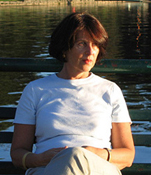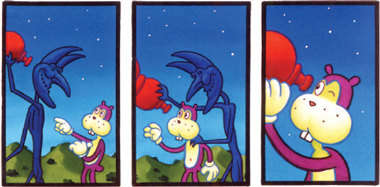 Dorit Abusch (Linguistics) Cornell University. Website.
Dorit Abusch (Linguistics) Cornell University. Website.
Dorit Abusch is Professor of Linguistics at Cornell. Her recent research concerns language and image, and applies semantic and pragmatic methods from linguistics to the analysis of sequential images. She has worked on tense, modality, presupposition, and indefinite quantification.
 Elisabeth Camp (Philosophy) University of Pennsylvania. Website.
Elisabeth Camp (Philosophy) University of Pennsylvania. Website.
Elisabeth Camp is an Associate Professor in the Philosophy Department at the University of Pennsylvania. She received her B.A. in English and Philosophy from the University of Michigan, Ann Arbor in 1993, and her Ph.D. in Philosophy from the University of California, Berkeley in 2003. She then spent 3 years at the Harvard Society of Fellows before moving to Penn in 2006. Camp works primarily in philosophy of mind and philosophy of language, focusing on various forms of "non-propositional" thought and talk. In particular, she has explored various forms of thinking and communication that exploit "perspectives," in which one concept or thought structures our overall understanding of a topic in an intuitive and holistic way. She has also written on sarcasm, fiction, and racial slurs; on the distinction between semantics and pragmatics; and on animal cognition and the difference between thinking with maps and with sentences. She regularly teaches undergraduate and graduate courses on mind, language, meaning, art, and the emotions.
 Elsi Kaiser (Linguistics) University of Southern California. Website.
Elsi Kaiser (Linguistics) University of Southern California. Website.
Elsi Kaiser is an Associate Professor in the University of Southern California's Linguistics Department. She earned her Bachelor of Arts in Germanic Language and Literatures from Princeton University; her Master of Arts in Psychology from the University of Pennsylvania and her Ph.D. in Linguistics also from the University of Pennsylvania. Prior to joining USC in 2005, she was a post-doctoral researcher at the University of Rochester. Her primary research focus is in psycholinguistics. She is especially interested in how different kinds of information interact and are integrated during language processing and what this can tell us about the nature of the mental representations activated during processing. She approaches these themes primarily from the perspective of reference resolution-- both across and within clauses-- focusing on the comprehension and production of different kinds of referential forms across languages, especially pronouns, reflexives and demonstratives. For example, how do information structure and discourse structure, including notions such as causality, influence people's use and interpretation of pronouns? In her own research and in collaborative work, she has explored these and related issues in a range of languages, including English, Finnish, Estonian, Dutch, German, Chinese and Korean. Her research methodology is interdisciplinary in nature, and incorporates tools and insights from linguistic theory as well as behavioral experiments using methods such as visual-world eye-tracking. Her publications include papers in journals such as Cognition, Language and Cognitive Processes, Lingua and Discourse Processes.
 Tim Smith (Psychology) Birkbeck College, University of London. Website. Blog.
Tim Smith (Psychology) Birkbeck College, University of London. Website. Blog.
Tim J. Smith BSc. Hons, PhD. is a lecturer in the Department of Psychological Sciences, Birkbeck, University of London. He applies empirical Cognitive Psychology methods to questions of Film Cognition and has published on the subject both in Psychology and Film journals.
 Matthew Stone (Computer Science) Rutgers University. Website.
Matthew Stone (Computer Science) Rutgers University. Website.
Matthew Stone is Associate Professor in the Computer Science Department and the Center for Cognitive Science at Rutgers. He got his PhD in 1998 from the University of Pennsylvania. He studies computational models of conversation, particularly models of utterance production, for intelligent agents that interact naturally with human partners. He recently concluded a term on the editorial board of the journal Computational Linguistics and served as program co-chair for the 2007 North American Association for Computational Linguistics Human Language Technology Conference (NAACL HLT).
 George Wilson (Philosophy) University of Southern California. Website.
George Wilson (Philosophy) University of Southern California. Website.
George Wilson received his PhD in Philosophy from Cornell. He has taught at Pittsburgh, Johns Hopkins, the University of California at Davis, and, most recently, at USC. He visited at Princeton University and at Harvard, and he has been a Fellow at the National Humanities Center He is the author of three books: Narration in Light (Johns Hopkins University Press, 1986), The Intentionality of Human Action (Stanford University Press, 1989), and Seeing Fictions in Film (Oxford University Press, 2011). He is the author of numerous articles in the philosophy of language, the theory of action, aesthetics, and on the later Wittgenstein.









